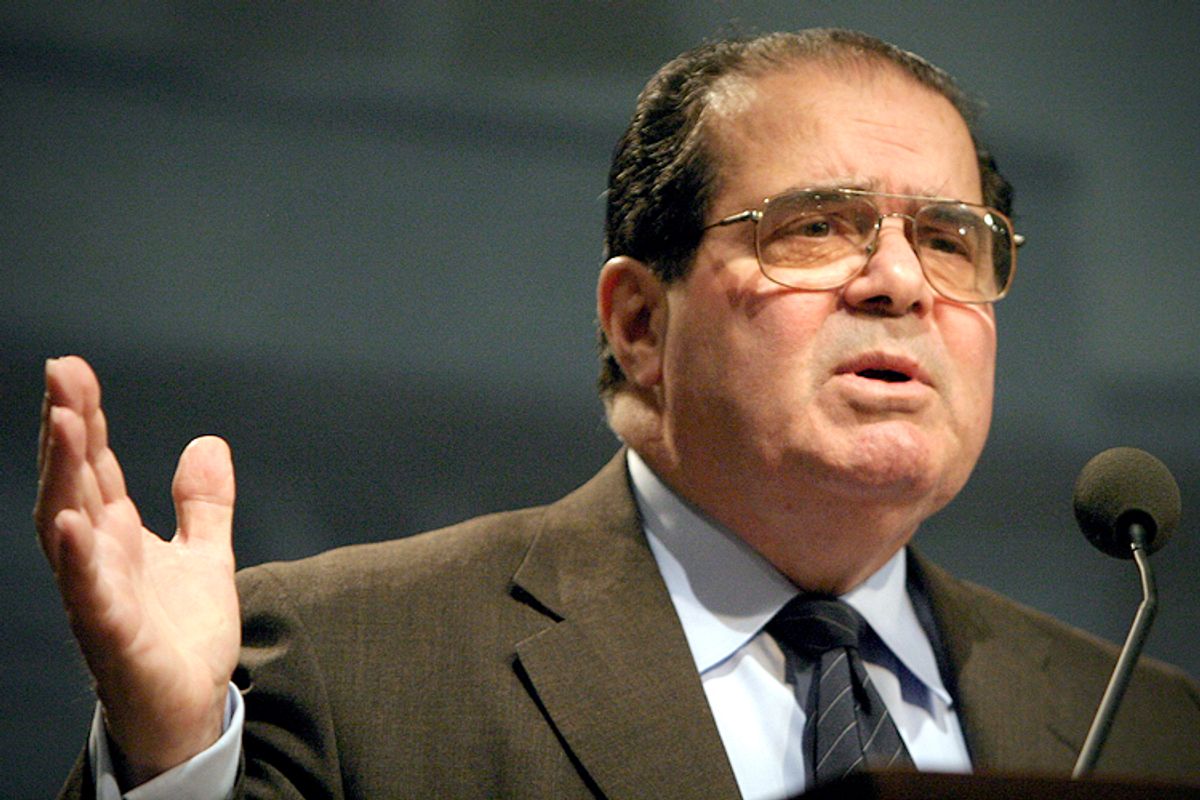It's certainly appropriate to mourn the passing of Justice Antonin Scalia and remember his passion and wit. But let's also remember that his view of the Constitution hurt millions of Americans excluded from his theory of constitutional originalism.
Take for example his view of the Voting Rights Act. For Justice Scalia, the Voting Rights Act—gutted by Scalia and his conservative colleagues in 2013's Shelby County v. Holder, was a “racial entitlement,” a form of “racial preferment” which affected only African Americans while ignoring the white population.
Such statements indicate that Justice Scalia was woefully ignorant of the Voting Rights Act’s history. Because of our nation’s painful history of racial injustice, the Voting Rights Act has often been used to safeguard black voters specifically—but its protections extend to all Americans regardless of their skin color, as the Act’s early years vividly demonstrate.
In May 1966, thanks to the enactment of the Voting Rights Act the previous August which also led to the abolition of the poll tax, African Americans were able to vote freely for the first time in an off-year primary election. Across the South, many sought a host of elected offices from county sheriffs to seats in their state legislatures. In Alabama, a Democratic candidate for governor, Attorney General Richmond Flowers, was vigorously campaigning for black votes. If elected, he promised to appoint blacks to positions in his administration—men and women active in the civil rights movement, he assured them, not “just a few Uncle Toms.”
The favorite to win in Alabama, however, was not Flowers. It was his opponent, Lurleen Wallace, a stand-in for her husband George, the gubernatorial incumbent who was ineligible to run again because of term limits. A vote for the Wallace ticket would be a vote for segregation; George Wallace had been the scourge of the civil rights movement in Alabama, and a politician who had actively incited racial hatred in order to obtain the support of white voters.
On election day, the turnout was extraordinary. In Selma, the polls opened at 8 a.m., but black voters started to line up hours before. In Birmingham a blistering sun caused one older man to faint, but when an ambulance arrived, he refused to go to the hospital until he voted. “This is the first time I’m voting,” he said. “It might be my last.” Voting continued far into the night. In Montgomery the polls were supposed to close at 6 p.m., but at 8:30 p.m., 1,100 African Americans were still waiting at the polls and refused to leave until they had voted. At that same hour in Birmingham, 700 waited patiently for more than five hours before they were able to vote. “It made me think I was sort of somebody,” said Willie Bolden, eighty-one, the grandson of slaves.
For African Americans, the outcome was disappointing. Few black candidates were elected, and Mrs. Wallace won a resounding victory, receiving an incredible 399,024 votes, nearly twice as many as her husband had won four years earlier. Few had doubted that Mrs. Wallace would win but it was the size of her victory that was truly surprising. And it was due, in part, to the Voting Rights Act.
Analysts later discovered that while their projections had accounted for the historic enfranchisement of Alabama’s blacks, they had missed an equally important development—the even greater expansion of the white vote. By eliminating the literacy tests and other impediments like the poll tax, the Voting Rights Act gave many poor whites the opportunity to register and vote. A skillful get-out-the-vote campaign by Wallace’s staff added 110,000 new white voters to the white majority, decreasing black influence even as it grew. Nor was this phenomenon limited to Alabama. Throughout the South, almost all new registrants were white.
This historic election indicates that Justice Scalia was wrong when he called the Voting Rights Act “a racial preferment” that provides no protection for white voters. The Voting Rights Act protected all voters, especially in the states and districts once covered by Section 5, from any obstacles that might be put in their way. That was true in 1966 and it is true today, as efforts to suppress the minority vote continue. Justice Scalia's ideology kept him frozen in a past that prevented African Americans, women, Hispanics and the poor--both black and white--from being full-fledged citizens. We can honor the man without sharing his arcane views.


Shares